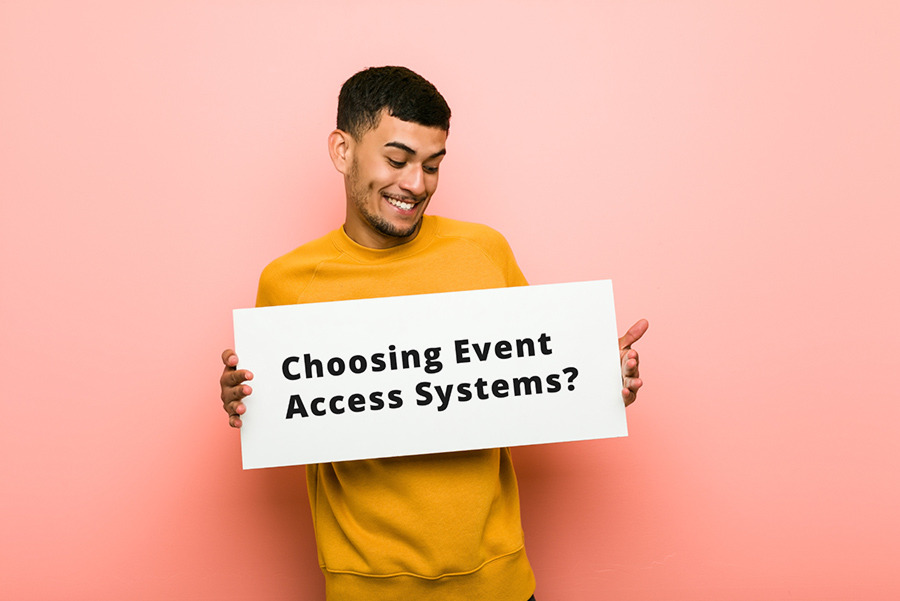Planning a successful event involves managing a complex web of details, and security sits at the forefront. From VIP access control to smooth crowd management, the right access control system can streamline entry, enhance the guest experience, and provide valuable data. While organizers often focus on best practices of event access management, a lot of thought needs to be given on the choice of access control system.
This guide explores key factors to consider when choosing an access control system that perfectly balances your event's needs, budget, and venue limitations.
Role of access control systems in event security
Electronic access control ensures authorized access by validating credentials like tickets or badges. This streamlines entry compared to manual verification, reduces queues, and improves overall security. Access control systems also gather data on entry times and access points, providing valuable insights for future events, like identifying peak traffic times or underutilized areas.
Understanding Access Control Needs of Your Event
The type and size of your event, security level required, and number of entry points all influence the access control system you choose.
- Event size and type
Large conferences with thousands of attendees may require multiple access points with fast validation methods like RFID scanners. Formal events might prioritize aesthetics with discreetly placed readers or sleek access points that blend in with the décor. Consider the event type as well – concerts might require age verification alongside access control to create a safe and appropriate environment.
- Level of security required
High-security events like galas or exhibitions showcasing art or antique valuables might require biometric scanners for enhanced identification. Lower-security events like food festivals can use simpler methods like barcode scans. Assess the level of security your event demands and choose a system that meets those needs without creating unnecessary friction for attendees.
- Number of entry points
The number and location of entry points affect access control needs. Large venues with numerous access points might benefit from cloud-based systems for central management and real-time data collection. Conversely, smaller events with a single entry point might opt for a self-contained system that is easier to set up and manage.
- Choose your access control method
Choosing the right access control method for your event hinges on security needs and complexity.
RBAC (Role-Based Access Control) assigns permissions based on pre-defined roles (attendee, VIP, etc.) This simplifies management for complex events with multiple access levels.
MAC (Mandatory Access Control) enforces strict security through pre-defined labels assigned to data and users. Access is granted only when a user's label matches or exceeds the required level. Ideal for high-security events with sensitive information.
DAC (Discretionary Access Control) grants control to the owner of a resource (data or area) to decide who can access it. This is simple to set up for low-security events but can be less secure due to individual control.
Types of Access Control Systems
Here's a breakdown of popular access control system options: key cards, wristbands/wearable tech, mobile app systems, and biometric scanners.
- Key card systems
Key cards offer a simple and cost-effective solution for access control. They are programmed with access permissions and scanned by readers at entry points. While affordable and easy to use, they can be lost or stolen, and access cannot be revoked remotely. Additionally, key cards might not be ideal for events where attendees frequently move between different areas, as they require constant possession for access.
- Wristbands/Wearable Tech
Wristbands come with various forms of tech integrations like barcodes or RFID chips. They offer convenience and reusability compared to key cards. RFID wristbands have revolutionized access control, allowing for contactless scanning, faster entry times, and data collection for tracking purposes. They can be customized for aesthetics and functionality, making them a popular choice for events. When choosing the best wristband for your event, look for features like waterproof materials for outdoor events or tamper-proof closures to enhance security.
- Mobile app systems
Mobile app systems offer a user-friendly and contactless entry experience. Attendees download an event app, receive digital passes or tickets within the app, and gain access by holding their phones near readers. This method eliminates the need for physical credentials and allows for real-time updates on event schedules or venue maps. However, it requires smartphone compatibility and internet connectivity at the venue, which may not always be reliable.
- Biometric scanners
Biometric scanners offer high-security identification through fingerprint, handprint, retinal scan, or voice recognition. They are tamper-proof and reliable, making them ideal for events requiring restricted access, such as high-value exhibitions or backstage areas. However, the initial investment can be higher, and not everyone feels comfortable with biometric data collection. Additionally, some attendees might find the scanning process intrusive.
Explore more about popular tech integrations with event access control systems.
Factors to Consider When Choosing an Access Control System
Now that you understand the different access control system types and their functionalities, it's crucial to consider several factors to ensure you choose the perfect fit for your event. Here are some key areas to evaluate:
- Cost effectiveness
Costs can vary depending on the chosen system, its features, and the number of access points required for your event. Consider the initial investment in hardware and software, as well as ongoing costs like maintenance and technical support. Analyze the cost against the security needs and potential return on investment (ROI) for your event. A scalable system might be ideal if you host recurring events, allowing you to adjust features or access points based on attendance fluctuations.
- Ease of use
A user-friendly system is crucial for efficient implementation, staff training, and access permission management. A well-designed interface with clear instructions simplifies operations for both staff and attendees. Consider the technical expertise of your team and choose a system that offers intuitive features and readily available support resources. Explore options with features like role-based access control, allowing you to assign specific permissions to different staff members for streamlined management.
- Integration with existing technology
Ideally, your access control system should integrate seamlessly with existing technology you use for event management. Explore if the system can connect with legacy card reader technology you might already have in place, or integrate with your ticketing or registration software. This eliminates the need for duplicate data entry and ensures a smooth workflow. Consider cloud-based systems for their inherent scalability and ability to integrate with various platforms.
- Compliance and Regulation Requirements
Depending on your event location and industry, there might be specific compliance or regulatory requirements for access control systems. Research any data privacy regulations that govern how you collect and store attendee information. Ensure the chosen system adheres to these regulations with features like secure data encryption and clear user consent protocols. For events in certain sectors like healthcare or finance, there might be stricter access control mandates. Identify these requirements beforehand and choose a system that meets those compliance standards.
- Support and Maintenance
Reliable technical support is essential to ensure the smooth operation of your access control system throughout the event. Look for vendors who offer comprehensive support plans, including pre-event setup assistance, on-site troubleshooting during the event, and ongoing maintenance services. Adequate training for your staff on using the system is also crucial. Consider including these factors when evaluating the service agreements offered by different vendors.
- Access permissions customization
The ability to customize access permissions is essential for managing different attendee categories at your event. You might need to create different access levels for VIPs, exhibitors, staff, or general attendees. The chosen system should allow you to define these access levels and assign specific areas or functionalities within the venue to each category. This ensures that attendees can only access authorized areas, enhancing security and overall event flow.







